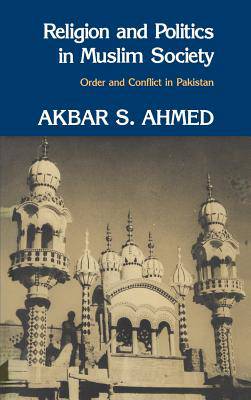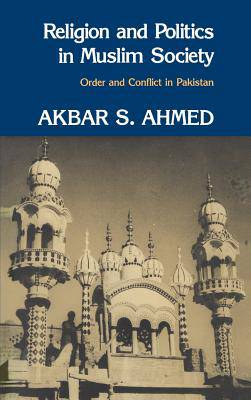
Bedankt voor het vertrouwen het afgelopen jaar! Om jou te bedanken bieden we GRATIS verzending (in België) aan op alles gedurende de hele maand januari.
- Afhalen na 1 uur in een winkel met voorraad
- In januari gratis thuislevering in België
- Ruim aanbod met 7 miljoen producten
Bedankt voor het vertrouwen het afgelopen jaar! Om jou te bedanken bieden we GRATIS verzending (in België) aan op alles gedurende de hele maand januari.
- Afhalen na 1 uur in een winkel met voorraad
- In januari gratis thuislevering in België
- Ruim aanbod met 7 miljoen producten
Zoeken
Religion and Politics in Muslim Society
Order and Conflict in Pakistan
Akbar S Ahmed
Hardcover | Engels
€ 172,95
+ 345 punten
Omschrijving
This analysis of Muslim unrest is based on an extended case study of northwestern Pakistan. Professor Ahmed examines power, authority, and religious status as the critical intermediary level of society: that of the district or Agency, which was the key unit of administration in British India. Amhed has joined his insights as anthropologist with his experience as a political agent in Waziristan to produce an innovative and detailed work. The book focuses on the emergence of a mullah in Waziristan who challenges the state. A religious leader's challenge of the state is not new; but contemporary Muslim society's widespread concern over these conflicts reveals that the influence of religion in a traditional society undergoing modernization is greater than many scholars have assumed. The author identifies three types of leaders: traditional leaders, usually elders; representatives of the established state authority; and religious functionaries. From this analysis he constructs an 'Islamic district paradigm, ' which he uses not only in making sense of contemporary Muslim society, but also in understanding some aspects of the legacy of the colonial encounter.
Specificaties
Betrokkenen
- Auteur(s):
- Uitgeverij:
Inhoud
- Aantal bladzijden:
- 232
- Taal:
- Engels
Eigenschappen
- Productcode (EAN):
- 9780521246354
- Verschijningsdatum:
- 28/10/1983
- Uitvoering:
- Hardcover
- Formaat:
- Genaaid
- Afmetingen:
- 152 mm x 229 mm
- Gewicht:
- 512 g

Alleen bij Standaard Boekhandel
+ 345 punten op je klantenkaart van Standaard Boekhandel
Beoordelingen
We publiceren alleen reviews die voldoen aan de voorwaarden voor reviews. Bekijk onze voorwaarden voor reviews.









